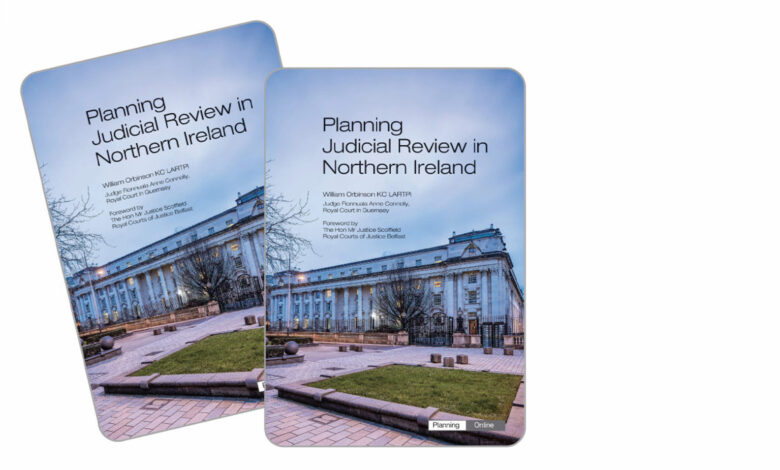Challenging times: Planning judicial review in 2024

The Judicial Review Court increasingly plays an important role in supervising Northern Ireland’s planning system. So, what is new in planning judicial review in 2024?
The test for leave
There has been a tendency to think that the test for granting leave or permission to bring a judicial review was the low hurdle of the points of challenge being arguable, regardless of whether they were likely to succeed at the substantive hearing, but the courts have stressed that the test is actually a dual one – “Leave should only be granted if the court is satisfied that there is an arguable case having a realistic prospect of success” – Kinney J, Re McLaughlin, affirmed by the Court of Appeal in 2024.
The relevance of alternative remedy
In Re Glebe Homes Ltd, the applicant sought leave to challenge refusal of permission for two dwellings in Hillsborough. Leave was refused because no arguable case with a realistic prospect of success had been made out, and in any event the challenger had the alternative remedy of appealing to the Planning Appeals Commission, which Humphreys J concluded was:
“… demonstrably more efficacious than judicial review. The latter could only result in a quashing of the planning decision and remittal back to the council for redetermination. The PAC… can allow the appeal and grant the planning application… the outcome desired by the applicant in a manner which is bound to be quicker and more cost effective. The PAC can weigh up material considerations and interpret planning policy in the same manner as the council.”
Redetermination of quashed planning decisions
Something not always appreciated is that a planning decision being quashed does not reverse that decision but merely voids it, so that the matter is returned to the original decision-taker for redetermination. Importantly, redetermination must take place having regard to the material considerations in play at the point of redetermination, which are not necessarily the same considerations which were material at the time of the original decision. That was made clear by Humphreys J in Glebe Homes: “When a decision is quashed by a court and redetermined, the material considerations to be taken into account at the time of redetermination are those which exist at the date of the redetermination.”
Local Development Plan policy must be interpreted by reference to its aims and intent
In Belfast City Council v PAC, the challenge centred around decisions to refuse planning permission to enable retrospective change of use from residential to short term holiday let accommodation for two apartments at Citygate, Belfast. The PAC allowed the appeals against these decisions. The applicant sought to challenge that decision, arguing that it had misinterpreted the relevant planning policy. Humphreys J quashed the PAC’s decision, finding that it had misinterpreted policy HOU13 of the Council’s Plan Strategy when interpreting what the word ‘property’ meant:
“A word such as ‘property’ in a planning policy is to be given its ordinary, natural, commonsense meaning within the context of the policy itself. It does not require to be subjected to intense forensic analysis. The relevant context will be spelt out by the aims and justification of the policy itself… The policy aims to preserve properties in permanent residential use by requiring part of the property to be retained in that state. The only coherent interpretation of the word ‘property’ in this policy must be the individual dwelling, whether that be an apartment or a house… HOU13 (f) serves to further the aims of the strategy by ensuring that properties are kept in permanent residential use whilst parts of them can be let by the owners on a short-term basis. To find otherwise is to wholly ignore the stated aims and intent of the policy and thereby to defeat it.”
Policy in an emerging, unadopted Local Development Plan can be a material consideration, and can be given determining weight
Again in Glebe Homes, Humphreys J made it clear that, given regional planning policy including the often-forgotten 2005 Joint Ministerial Statement, planning decision-takers could not only properly take into account emerging Local Development Plan policy which has not yet been adopted, but also where appropriate give it determining weight:
“Even when a decision maker is considering an application in light of an extant plan, the policies in an emerging plan can be taken into account and, indeed, may have determinative weight. This will particularly be so when the emerging plan is at an advanced stage of the process and no objections have been lodged to the particular proposal under consideration”.
Sometimes, decisions can be so unreasonable that the courts will quash them
In the No Gas Caverns case, the Court of Appeal quashed decisions by the Department of Agriculture, Environment and Rural Affairs to grant licences authorising the installation of a five million cubic metre underground gas cavern storage facility in Larne Lough. One of the successful grounds of challenge was that the first instance judge had wrongly concluded that the decisions were not decisions which had to be referred to the Executive Committee under the Northern Ireland Act 1998 and that the decisions did pass the threshold for referral of being significant, controversial, or cross-cutting. Factors influencing that conclusion were that the Minister had not sought to explain why the project was not considered significant or controversial, where on the face of it the decisions were of economic significance and of strategic significance in terms of energy security and supply, and where the decisions on the face of it conflicted with international and domestic climate change standards – “…it seems logical to us that given the climate commitments now enshrined in our law that decision makers on large scale projects such as this will have to consider and rationalise any convergence or divergence with those standards set in law”.
From the Foreword to Planning Judicial Review in Northern Ireland, William Orbinson KC Legal Associate RTPI and Judge Fionnuala Anne Connolly, Royal Court of Guernsey, Planning Online 2024“This text will be of much use to those involved in actual or anticipated judicial review challenges relating to planning decisions. The unique benefit is the comprehensive citation of case-law from the High Court and Court of Appeal in Northern Ireland, which is frequently featured in the major planning law texts by way of fleeting reference only, if at all. I wholeheartedly commend this publication… one which should be kept to hand by all who work in this field.” The Honourable Mr Justice Scoffield |
These cases – and all important local judicial review judgments dating back to the 1980’s – are discussed in the recently-published Planning Judicial Review in Northern Ireland, available from Planning Online www.planningonline.co.uk.

T: 078 6024 5324
E: william.orbinson@barlibrary.com
W: www.williamorbinson.co.uk





